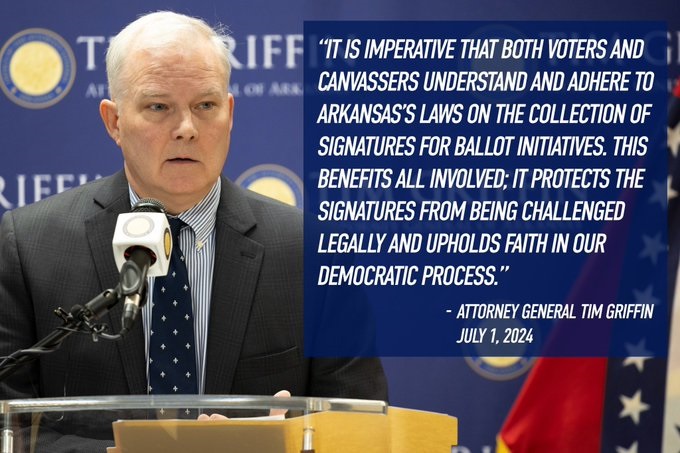
On Monday the Arkansas Attorney General’s office issued a ballot integrity alert.
The A.G.’s alert says, “It is imperative that both voters and canvassers understand and adhere to Arkansas’s laws on the collection of signatures for ballot initiatives.”
The alert notes that in Arkansas it is a felony for a petition canvasser to:
- Sign someone else’s name to a petition;
- Print someone else’s name, address, or birth date. If the signer requires assistance due to disability, a person other than the canvasser may print the signer’s name, address, birth date, and the date of signing. The person providing assistance must sign and print his or her own name in the margin of the petition;
- Ask for or obtain a signature when the canvasser knows that the person signing is not qualified to sign the petition;
- Pay someone to sign;
- Knowingly misrepresent the purpose and effect of the petition or the measure in order to persuade someone to sign; or
- Falsely swear to have witnessed all signatures on the petition page.
By law, petition canvassers in Arkansas must be at least 18 years old. They must be a U.S. citizen and a resident of Arkansas. The law also says canvassers must personally witness all signatures on the petition.
The A.G.’s ballot integrity alert comes as groups work to enshrine abortion and marijuana into the Arkansas Constitution via the petition process.
Arkansans for Limited Government has until July 5 to collect 90,704 valid signatures from registered voters to place the Arkansas Abortion Amendment on the November ballot.
The measure would write abortion into the state constitution, allowing thousands of elective abortions in Arkansas every year.
The amendment does not contain any medical licensing or health and safety standards for abortion, and it automatically nullifies all state laws that conflict with the amendment. That jeopardizes even the most basic restrictions on abortion.
The measure contains sweeping exceptions that would permit abortion through all nine months of pregnancy in many cases.
The amendment also would pave the way for publicly funded abortion in Arkansas by changing Amendment 68 to the Arkansas Constitution that currently prohibits taxpayer funded abortion in the state.
Right now the group Arkansans for Patient Access is actively working to drastically expand marijuana in Arkansas.
If passed, the marijuana amendment would give free marijuana cards to immigrants and out-of-state residents who come to Arkansas to use marijuana.
The amendment would guarantee marijuana growers and sellers a monopoly over the state’s marijuana industry.
Marijuana users would no longer need to show they suffer from a specific medical condition listed in state law — making it easier to use marijuana recreationally.
The measure also fails to limit the amount of THC that marijuana products can contain, and it repeals restrictions on marijuana advertising.
All of this would lead to more marijuana in the state.
The A.G.’s entire ballot integrity alert is available below:
LITTLE ROCK – With the deadline for submittal of signatures on statewide ballot initiatives fast approaching, Attorney General Tim Griffin reissued guidance on the rules that govern the collection of signatures:
“As the July 5 deadline for signature submission draws near, there will likely be many people across the state this week making a final push to collect signatures for various ballot measures. It is imperative that both voters and canvassers understand and adhere to Arkansas’s laws on the collection of signatures for ballot initiatives. This benefits all involved; it protects the signatures from being challenged legally and upholds faith in our democratic process.”
The law requires that canvassers:
• Be 18 years of age or older, a U.S. citizen, AND an Arkansas resident.
• Personally witness all signatures on the petition.It is a felony for a canvasser to:
• Sign someone else’s name to a petition;
• Print someone else’s name, address, or birth date. If the signer requires assistance due to disability, a person other than the canvasser may print the signer’s name, address, birth date, and the date of signing. The person providing assistance must sign and print his or her own name in the margin of the petition;
• Ask for or obtain a signature when the canvasser knows that the person signing is not qualified to sign the petition;
• Pay someone to sign;
• Knowingly misrepresent the purpose and effect of the petition or the measure in order to persuade someone to sign; or
• Falsely swear to have witnessed all signatures on the petition page.If you are approached by a canvasser, remember that:
• Only registered voters may sign a petition;
• All signatures must be in the signer’s own handwriting and must be given in the presence of the canvasser;
• Because petition parts are separated by county, signers should only sign petition parts for the county in which the signer is registered to vote;
• Arkansas law requires that a full and correct copy of the popular name, ballot title, and text of the initiated or referred measure be attached to every petition at all times during a petition’s circulation. This is so potential signers may read the full text of what they are being asked to sign;
• The information a signer provides on a petition may be disclosed in response to a records request made under the Arkansas Freedom of Information Act.We have received reports of canvassers leaving petitions unattended in public places. What is the effect of someone signing an unattended petition?
• This is a canvasser violation only if (1) someone signs that petition while the canvasser isn’t there and (2) the canvasser signs the affidavit in the bottom corner of the signature page. If both the foregoing happen, then two legal consequences occur: (1) people attacking the petition can argue that every signature page gathered by that canvasser be tossed out; and (2) the canvasser can be convicted of a felony for falsely swearing to have witnessed the signatures that occurred in his or her absence.Regarding the collection of signatures on private property:
• Signature collectors should ensure that their ballot-related activities comply with any posted signs and are conducted with the consent of private property owners.Any complaints or allegations of misconduct in the ballot-initiative process should be directed to the Election Integrity Unit, Office of the Attorney General at (833) 995-8683.
To download a PDF version of this alert, click here.
Articles appearing on this website are written with the aid of Family Council’s researchers and writers.



